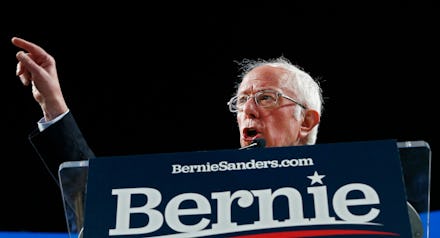Bernie Sanders's Nevada victory shows he can win big among minority voters

Bernie Sanders’s mammoth win in the Nevada caucuses — by a margin of more than 25% — solidified his status as the frontrunner in the 2020 Democratic primary. The Nevada victory held symbolic importance for the progressive Vermont senator for reasons that go beyond just racking up delegates or putting wins on the board, though. Crushing his opponents in such a diverse state helps put to bed a longstanding media narrative that had plagued his campaign since his 2016 defeat: that Sanders almost exclusively appeals to white voters, and could never win in states with large minority populations.
In Nevada, Sanders romped among Latino voters, winning the bloc by 40% according to entrance polls from last week’s caucuses. He also proved competitive with Black voters, losing them by only 12% to former Vice President Joe Biden. That’s especially troubling for Biden, who had thus far appeared to have a major advantage with Black voters, and who has long maintained that he alone can build the diverse coalition needed to win the election.
If Sanders is able to improve his support among Black voters following his Nevada victory, he should prove highly competitive in South Carolina — and potentially be able to deliver Biden a knockout blow there. And a nationwide poll released Monday, conducted after Saturday’s Nevada caucuses, indicates that Sanders may do just that. Morning Consult found that Sanders is currently leading among Black voters with 30% support, to both Biden and Bloomberg’s 25%. Meanwhile, the Vermont senator is leading among Hispanic voters with a whopping 45% to Bloomberg’s 16%; Biden lags behind both at 9%. These numbers, if they hold up, will give Sanders a broad coalition capable of dominance in states around the country on Super Tuesday.
In a victory speech after it was clear he’d run away with Nevada, Sanders made note of his multi-racial coalition. “When I look out at an audience like this and I see the diversity and beauty in this audience,” he said Saturday from a rally in Texas, “I have absolute confidence we can create a government based on compassion, based on love, and based on truth — not what we have now of greed, corruption, and lies.”
In 2016, there was some truth to the idea that Sanders appealed mainly to white voters. He beat Hillary Clinton in the second nominating contest in the largely white state of New Hampshire — notably, a neighbor to his home state of Vermont — only to lose Black voters by massive margins in South Carolina and other Southern states. And last year, The New York Times reported that some of his 2016 staffers responsible for outreach to Black voters complained that they were being sidelined and not receiving adequate funding from the campaign.
For 2020, however, Sanders appears to have fine-tuned his messaging and outreach. “In South Carolina before, his speeches did not lend themselves to being embraced by the African American community,” said the influential Black congressman from South Carolina, James Clyburn, in an interview with The New York Times. A 2019 speech about racism, Clyburn said, “showed much more sensitivity to the dreams and aspirations of African Americans than his speeches did in 2016.”
The first glimpses of Sanders’s revamped approach to minority voters came in Iowa, where he dominated in a Spanish-language caucus and a caucus held at a mosque in Des Moines. There, Middle East Eye described "near unanimous support" for Sanders; he also received a key endorsement from an Iowa Muslim group.
What Sanders’s Nevada margins have shown is that it's hard to claim that his candidacy or his democratic socialist ideas are specifically acting as a turn-off to minority voters. That idea — repeated endlessly by TV pundits besotted with the “white Bernie bro” narrative — has turned out to be a pretty facile when confronted with real voters.
Yes, Clinton attracted the vast majority of Black voters four years ago. That doesn’t prove that they all hated Sanders, but rather that they liked Clinton more. That made sense, considering her close ties to two presidents who were immensely popular with Black voters in Barack Obama and Bill Clinton, as well as through policy advocacy and personal outreach of her own. But this time around, as he consolidates support in diverse states across the country, the notion that Sanders could never earn Black and Latino votes seems unlikely to survive.